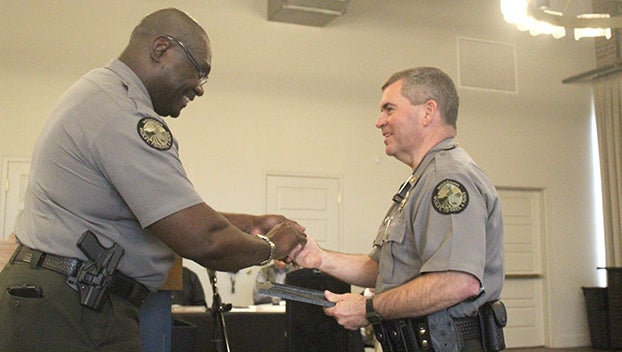County roads are paved with good intentions
Published 8:07 pm Saturday, October 22, 2016
Lincoln County is ranked in the top five for the number of total miles of roads the Board of Supervisors is responsible to maintain but ranked way down around 22nd for the assessed values that create the tax dollars to fund the upkeep.
“We’ve got more road miles on less tax dollars,” said County Administrator David Fields, who has been crunching budget numbers for Lincoln County for 19 years.
With only one municipality — Brookhaven — to pay for its city roads, supervisors have their hands full, but not with money.
They do what they can with what they have, Fields said.
“It’d take $20 million to get our roads all overlayed,” Fields said. “I don’t know. It might take $200 million.”
That could be a slight exaggeration, but the lack of funds to keep tax payers riding smoothly is no joke.
In the past, supervisors have counted on oil severance taxes, which is money paid by the state and is stuck in the county’s road and bridges fund. But because oil is a natural resource, the county can’t count on its production for steady revenues. The county is at the mercy of the oil companies, Fields said. If they’re not pumping, they’re not paying.
The oil severance tax Lincoln County receives from the state has been steadily on the decline. The county received $2.2 million from the state to go toward roads and bridges in 2008. The next year, they got just $1.3 million, and it continued to drop. In 2015, it dropped below a million dollars, bringing just $727,008 to the county.
So far this year, the county has received just $435,455, Fields said.
Of the 1,037 road miles in the county, District 1 Supervisor Jerry Wilson has the least to keep up, with just 105 miles, or just over 10 percent. District 3 Supervisor Nolan Williamson has the most with 266.9 miles, or 25.7 percent. District 2 Supervisor Bobby J. Watts has 218.6 miles (21.1 percent), District 4 Supervisor Eddie Brown has 232.8 miles (22.4 percent) and District 5 Supervisor Doug Falvey has 214.1 miles (20.6 percent).
In previous years, road and bridge funds were dispersed to the different districts with 16 percent to District 1 and 21 percent to each of the other districts.
The 2015-2016 budget was amended in February to better reflect the number of roads and bridges each supervisor is responsible for.
“All of the districts have different mileage and some of us were running real low on funds and some were getting too much, is what it amounted to,” Brown said at the time. “If you look by the old figures, the mileage was so unbalanced. We decided to amend the budget.”
Wilson opposed the amendment and obviously voted against it.
“I wouldn’t be in agreement if I was giving up money either, but it was the right thing,” Brown said. “Everybody gets equal money per mile of road in the district, each one is represented by equal money. Each taxpayer’s mile is worth the same.”
Wilson was affected the most in the change, and received $160,000 less in funds than usual. District 5 also received less. However, Districts 2, 3 and 4 received more. Williamson added almost $130,000 to his road budget because of the amended budget.
Supervisors are allowed by law to transfer money from their districts to other districts if all parties are agreeable. Wilson has asked for monetary assistance since the change but has been met with resistance. The other districts don’t have money to spare, Williamson said recently.
“The prices of gas and oil have affected severance tax; we’ve lost so much from those decreases,” Brown said in February after the board amended the budget. “We’ve lost so much, but this helps one part of it.”





